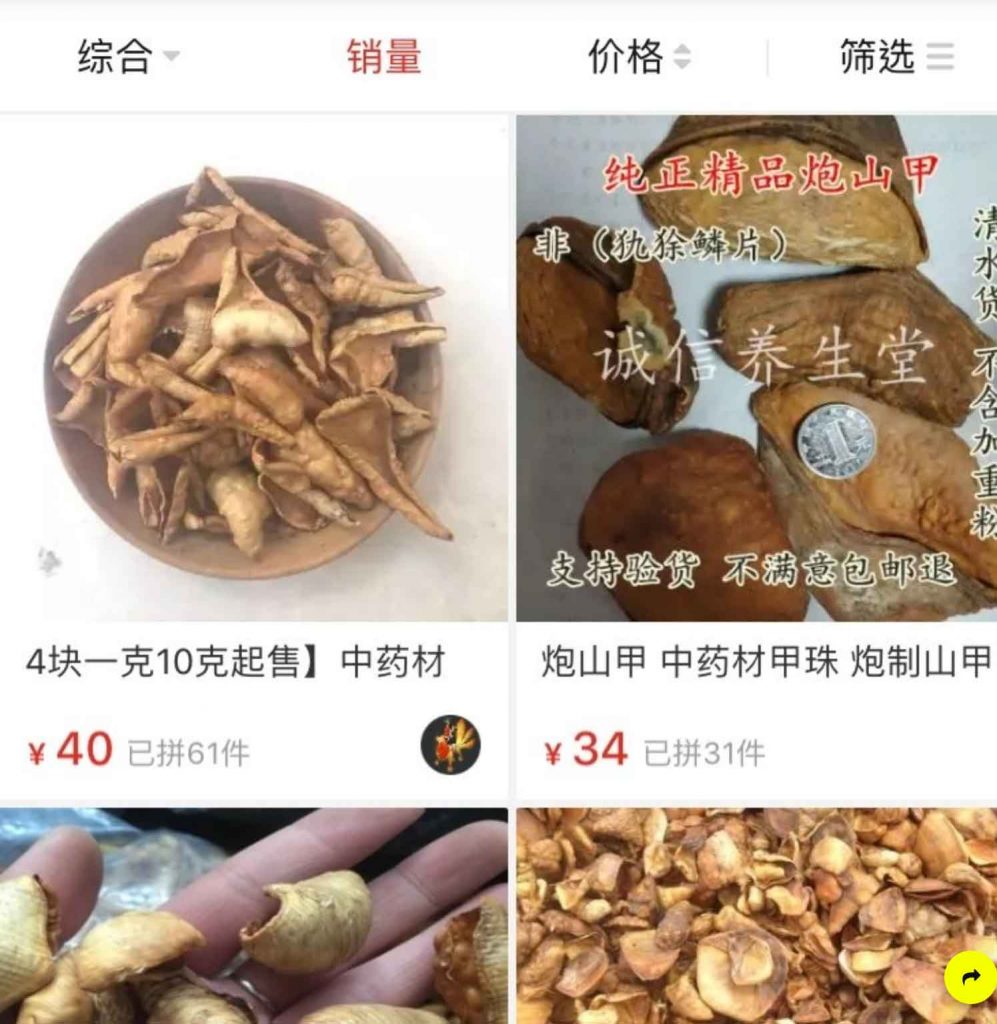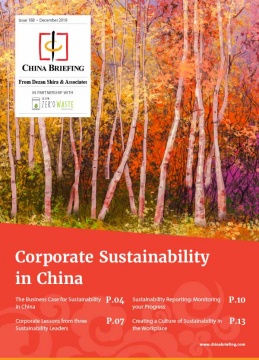Covid-19 Carriers: What Do China’s Wildlife Protection Laws Say about Pangolins?
Editor’s note:
On February 24, the Standing Committee of the National People’s Congress, China’s top legislature body, issued a decision to totally ban the illegal trade and consumption of wildlife as food. Use of wild animals for medicine, pets, and scientific research will be subject to “strict examination and approval” by the supervising departments. On March 31, Guangdong province became the first Chinese province to revise its local regulation on wildlife protection. From May 1, 2020, anyone who eats wild animals of national priority protection may be fined up to 20 times the value of the wildlife.
Op/Ed by Chris Devonshire-Ellis
Eating pangolins and other wild animals – what do China’s wildlife protection laws say?
While the source of the now-named Covid-19 coronavirus that has so seriously affected China has yet to be fully determined, suspicions are falling upon the Chinese Pangolin (Manis pentadactyla) as the most likely creature to have harbored the virus and then passed it to humans. 99 percent of the RNA of a coronavirus found in Pangolins is identical to Covid-19.
Pangolins are a type of anteater yet are considered a gourmet food across much of Asia. They are, however, endangered and are listed as a Category 2 protected species by CITES, to which China is a signatory. There have been calls to upgrade the pangolins’ status to Category 1, the highest, as its population has plummeted in the past decade, mainly as a result of poaching.
This means there is a disconnect between wildlife protection treaties that China signs up to and the actual behavior of some of its own citizens. That is an educational issue, and better wildlife protection and education of the Chinese of a national basis of the perils in consuming such creatures may have prevented such a catastrophe of the type we see today.
Covid-19, meanwhile, may just prove to be the savior of Chinese pangolins. They are unlikely to be back on the menu anytime soon.
Pangolins are used both as a gourmet meal – they are said to be delicious while the scales are used in traditional Chinese medicine (TCM). There are decent profits to be made by poachers; the meat sells for close to US$300 a kilo, while the scales fetch up to US$3,000 a kilogram.
Sun Xiuqing, a TCM doctor at Jingshan Hospital in Beijing was quoted saying in this rather distressing article that “Roast pangolin scales are used, combined with other TCM material, to promote blood circulation, dispel clotting or swelling, and it is used more often on women who want to stimulate lactation after giving birth, or on people who suffer from cancer.”
This tradition continues despite studies showing that there is no apparent benefit from consuming pangolin scales at all – they are made of keratin, the same as human fingernails.
So, the Chinese have signed up to CITES, but what do China’s own laws in terms of wildlife protection say?
China has a Wildlife Protection Law of the People’s Republic of China (amended in 2018).
According to this, all wildlife under national protection is divided into Grade I and Grade II categories of protection. This is reviewed every 5 years. Grade 1 animals are rarer and are under tighter protection, which means hunting them illegally may be punished more severely, while obtaining approvals for special license hunting is more difficult – applications need to be made to the Wildlife Conservation Department, which is under the direction of the State Council.
The most recent lists of protected animals in China can be found here. China generally follows CITES categorization, the panda, for example, is Grade 1 protected, while pangolins are Grade 2. According to the law, it is forbidden to hunt or kill wildlife under national protection (Article 21) without holding a special hunting license.
Article 41 outlines the penalties for breaking the law and illegally hunting nationally protected wild animals. These are:
- Confiscation of hunted objects, tools, and illegal gains;
- Revocation of other hunting licenses;
- A fine of more than two times and less than ten times the value of the property seized; if no property is seized, a fine of 10,000 yuan to 50,000 yuan (US$1,434 to US$7,173) shall be imposed; and
- If a crime is constituted, criminal responsibility shall be investigated according to law.
This now brings us to China’s Criminal Law on the subject, where Article 341 states: illegal hunting and killing rare and endangered wildlife under special state protection shall be sentenced to up to 10 years fixed-term imprisonment, along with fines and confiscation of property. The clause in full:
“Whoever illegally catches or kills the species of wildlife under special state protection which are rare or near extinction, or illegally purchases, transports or sells the species of wildlife under special state protection which are rare or near extinction and their products shall be sentenced to fixed-term imprisonment of not more than five years or criminal detention and concurrently be sentenced to a fine; if the circumstances are serious, the offender shall be sentenced to fixed-term imprisonment of not less than five years and not more than ten years and concurrently be sentenced to a fine; if the circumstances are especially serious, the offender shall be sentenced to fixed-term imprisonment of not less than ten years and concurrently be sentenced to a fine or confiscation of property.
Whoever, in violation of game laws or regulations, hunts in a game reserve, during a period when hunting is prohibited or using implements or methods that are prohibited, thereby damaging wildlife resources shall, if the circumstances are serious, be sentenced to fixed-term imprisonment of not more than three years, criminal detention, public surveillance or a fine.”
There appears to be no differences between punishments handed out for abuses of animals in Grade 1, or Grade 2, which leads us to believe these are probably discretionary. The Criminal Law especially is hard on convicted poachers, although the Wildlife law is less severe. Given that the China Biodiversity Conservation and Green Development Foundation (CBCGDF) estimates 60,000 wild pangolins were killed in China in 2018 alone, it is obvious the law, while on the statute, is not being upheld.
Pangolin can fairly easily be sourced in China, and there is a vibrant, if illegal online market for not just pangolin but other wildlife products. This is an image of them that appeared on the Pinduoduo website (subsequently removed):

The outbreak of Covid-19 therefore has serious educational, regulatory, and industry implications for China. These can be identified as follows:
- China’s wildlife laws need to be upgraded in terms of applicable punishment. Whoever caught and sold a suspected pangolin in Wuhan did so for a profit of a few hundred dollars. The impact cost will run into hundreds of billions of dollars and produce a death toll way into the hundreds.
- China’s criminal laws need to be enforced in every case of breaching the wildlife laws and the tough sentences already described within them implemented.
There are additional, wider ranging, and more problematic issues to deal with in the longer term.
- Online stores in China should face stiffer penalties for advertising illegal products;
- China’s traditional wet markets need to be better governed and managed, including regular and thorough checks. Vendors and the Chinese rural population, in particular, need better education concerning hygiene, the quality of produce, the desirability of keeping differing food products apart, ban the sale of wild animals, and curtail the entrance of wild animals such as birds, pigeons, and rodents;
- Wealthier Chinese need to be properly educated about the risks of eating wild animals. “Face” can be obtained instead via an expensive bottle of cognac or rare maotai – this is an educational and marketing issue;
- Chinese traditional medicine (TCM) is a multi-billion dollar industry in China, yet it is partially responsible for upholding discredited beliefs and quackery. It needs to be far better regulated. The consumption of items, such as pangolin scales, is rooted in the medieval, Ming dynasty past and does not belong to the modern, scientific society China aims to be.
Bringing the TCM market under better scientific and regulatory control will be a massive task for the CCP. The global market for products is estimated to be worth US$50 billion per annum, and many practitioners swear by it. However, many of the ingredients can be synthesized, and others are long based in ridiculous theories – consuming tiger penis making men more virile, for example. Dealing with TCM’s popularity in China is a huge political ask while the basis for it remains a symbol of national pride and beliefs. There are some acknowledged benefits to many TCM applications; however, the results of these can vary from patient to patient unless the specific active beneficial ingredient can be found. Yet, many preparations are against conducting such research; maintaining the mystery is a preferred sales and magical recovery tool.
Yet, it is clear such beliefs are partially responsible for the Covid-19 outbreak. Somehow the CCP need to find a way to deal with the issue. Writing in Forbes, Sergei Klebnikov says that the World Bank estimates that at best outcome, providing the Covid-19 outbreak doesn’t become more serious, global growth will be impacted by about US$500 billion this year. The political question for China is this: With the TCM industry worth US$50 billion, how many more outbreaks is it going to take before the government starts to make TCM, its beliefs, practices, and trading standards more accountable? And when will it start to uphold its own laws? China, and its own citizens, need to take stock of which traditions are valuable in their society, and in the aftermath of the coronavirus, which ones should now be cast aside.
Related Reading
-
- China’s Latest Regional Measures to Support SMEs during the Coronavirus Outbreak
- China’s Support for Foreign Investors, Trading Companies as Coronavirus Impacts Supply Chains
- Managing Your China Business during the Coronavirus Outbreak: Ongoing Updates and Advisory
 Corporate Sustainability in China
Corporate Sustainability in China
Faced with the new reality of a slowing economy and ongoing environmental issues, China now sees sustainability as essential to ensuring long-term viability for both its economy and its citizens’ quality of life. As the issue of sustainability gains traction in China and around the world, businesses are entering into a new era of accountability.
About Us
Chris Devonshire-Ellis is the Founding Partner and Chairman of Dezan Shira & Associates. He may be contacted at chris@dezshira.com.
Dezan Shira & Associates offer practical advice and solutions for foreign buyers and companies in the China market. If you need assistance with clarifications concerning the coronavirus and operational/supply chain issues, please contact us at china@dezshira.com or visit us at www.dezshira.com.
- Previous Article China Business Continuity Issues That Need to Be Addressed Now
- Next Article Shanghai-London Stock Connect Still Operating Normally: China Securities Regulatory Commission






